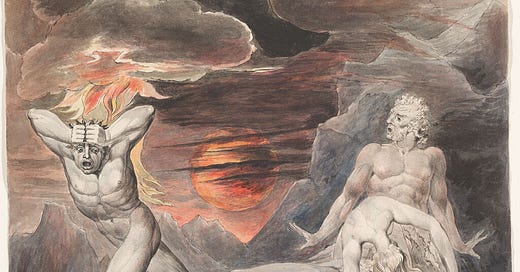Do you know the first question a person asks God in the Bible? Interestingly, even though the Creation account in Genesis quickly focuses on the first humans, they are not the first questioners. The first questions in the Bible are fascinating because of what they reveal, in turn, about each questioner.
The first questioner is Satan: “Did God actually say, ‘You shall not eat of any tree in the garden’?”1
The second questioner is God: “Where are you?”2 “Who told you that you were naked? Have you eaten of the tree of which I commanded you not to eat?”3 “What is this that you have done?”4
We’ll come back to the third questioner a little later.
Look at what each question tells us about the one who asks. Satan is a deceiver, an accuser, and he does both of those things in his question. You can almost hear his tone, dripping with false concern: “Are you sure you understood God correctly? Did he really say such a terrible thing?” The deception is in leading Eve to wonder if she misunderstood who God is. The accusation (cleverly left unsaid) is that God cannot be trusted, that he is unfair and unreasonable. That he is withholding something. Satan’s question masquerades as selfless concern, but he is actually setting himself up as the one who can be trusted instead of God.
God’s questions, on the other hand, are truly selfless and have concern only for the man and woman. He wants to find them, and he wants them to understand what they have done. They also indicate a pursuit. God is searching for them, and offering them the chance to confess and repent.
Satan and God ask questions that tell us, right here at the beginning of the Bible, what we can expect from each of them for the rest of the book. Satan’s question is devious. He will relentlessly lie about who God is and what he wants from us. His goal is to cause separation between people and God.
God, on the other hand, will relentlessly pursue us, refusing to accept the separation. He pursues us not out of an angry sense of justice, or with a desire to punish. His desire is reconciliation and the restoration of the relationship that was lost in Eden.
Now, the third questioner. He is a man, but not the first man. Depressingly, the first question only comes after the first murder. God asks Cain where Abel is, and Cain responds, “I do not know; am I my brother’s keeper?”5
It is rather shocking to me that the very first question a person asks in the Bible is sarcastic and angry. We like to think of humanity as being engaged in a general pursuit of wisdom and happiness, of fulfillment and love. That is certainly partly true. But what Cain’s question reveals to me is that there is an ugly anger deep in the heart of each one of us, a resentment that we would be obligated to anyone beyond ourselves.
I see Cain’s question everywhere. Ours is a culture whose chief virtue is self-realization, and nothing is permitted to get in the way. America has as many gods as it does people and each of us is devoted to our cult of one; our only true allegiance is to ourselves. The idea that anyone might have a claim on our lives, that we might be obligated to another person, is rejected.
Satan’s question appealed to Eve for the same reason that asking “Did God really say” or “Does the Bible really say” appeals to us today: We are inclined to be selfish, and if we don’t like what God wants or what the Bible teaches, we will look for a way around them both.
America has as many gods as it does people…
Cain asked his question with the same motivation as Satan, hoping to make God sound unreasonable. Except that God didn’t respond to Cain with, “Of course not, you’re right. I’m being unfair.” Instead, he responded by continuing the pursuit of his people for centuries. Since the very beginning, we have rejected our obligation to one another. It took our true Older Brother coming in person to rescue us from the consequences of that first murder by submitting himself to a second.
Genesis 3:1
Genesis 3:9
Genesis 3:11
Genesis 3:13
Genesis 4:9





Great points all. I've thought about that first question a lot. "Hath God said?" to borrow from the King James (although I'm not a King James fan). Today I believe all throughout our culture - the United States and the world - that people are not asking that question - at least on the surface. They are responding with a declarative. "It doesn't matter what God said .... if there is a God". Borrowing from Judges 17:6, 'every man does right in his own eyes' is the norm. Unfortunately, that "right" is a distorted if not perverted one.
It’s unbelievable how deep the selfishness goes. So thankful that Jesus gets the final word.